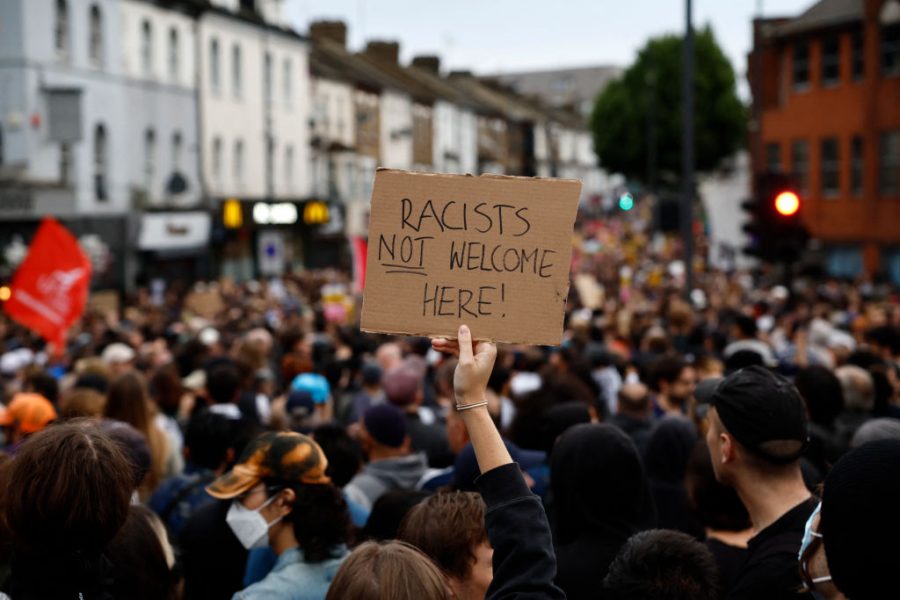Nearly half of Generation Z believes that Britain is a racist country, and a similar proportion say that they aren’t proud to be British. This is the grim finding of a study published in the Times yesterday, based on a YouGov survey and research by the opinion consultancy Public First of 18- to 27-year-olds.
The revelation sits in stark contrast with a study undertaken by the Times twenty years ago, in which 80 per cent of young people said that they were proud to be British. The discrepancy is even more stark when contrasted with a general consensus that Britain has become a less racist and more racially-aware place in the intervening period. Twenty years ago, the BBC was still broadcasting new episodes of the sketch show Little Britain, a programme that featured a skit with David Walliams in a blackface character. Back then, nearly everyone in television adverts was white. And back then, no-one had heard of ‘woke’, spoke witheringly of ‘white privilege’ or been subjected to diversion, equity or inclusion policies.
We can see here the regurgitation of woke clichés and ideology, in all its opacity and deviousness
We can only conclude that rather than becoming a more racist country, Britain has instead become neurotically and unduly obsessed with racism, thanks to the very woke revolution of the past ten years that sought to banish racial discrimination. This Times survey uncovers not so much facts or judgements based on observation, rather the evolution of a mindset that has been shaped and warped by a persistent narrative, implanted in schools over the years, and reinforced by universities, museums and galleries, that Britain is an irredeemably racist country. As Kemi Badenoch rightly responded to the findings: ‘This is what happens when we let divisive narratives run wild without setting the record straight’.
This divisive narrative is hammered home unrelentingly, even in seemingly innocuous ways, such as trigger warnings for television shows originally broadcast in living memory, like That Mitchell and Webb Look, Coronation Street and the aforementioned Little Britain – in 2023 that offending skit was duly condemned by Ofcom as ‘explicitly racist and outdated’. Such trigger warnings convey the message to Gen Z that even their parents’ generation are likely to be racists.
The language employed by those interviewed exposes the tangible influence of hyper-liberal woke dogma. One 23-year-old from Nottingham interviewed by Public First spoke of a country stained by ‘systemic racism’. She elaborated: ‘We don’t learn about black history but we were built on racism’, and that there remained as a consequence ‘deeply entrenched unconscious bias’. Another 23-year-old echoed this grievance, speaking of ‘systemic racism, casual racism’.
We can see here the regurgitation of woke clichés and ideology, in all its opacity and deviousness: its belief in racism being ‘systemic’ and ‘unconscious’, another way of saying ‘invisible’ and therefore impossible to disprove. A generation of young adults are not only parroting the mantras instilled in them in childhood and adolescence, they are also repeating the narrative that Britain’s history is a shameful tale of racism, colonialism and oppression.
Even those interviewed who dissented from today’s negative consensus demonstrate an awareness that the dominant narrative was itself a problem, and one that made matters worse. As Uthman Odusote, a 22-year-old from London, remarked on racism: ‘It is a tool that has become consistently utilised and weaponised to divide us as a people and distract us from other issues.’
The separation of the YouGov statistics into gender categories betrays further traces of hyper-liberalism’s ascent and sway. While 48 per cent of all those Zoomers interviewed agreed with the statement that Britain was a racist country, the figure rose to 58 per cent for women and dropped to 37 for men. The proportion of females who said they were proud to be British was also ten per cent lower than the average, at 31 per cent, as it was also for the number of female Zoomers who believed Britain was a tolerant nation.
Such a discrepancy conforms to a trend detected by Eric Kaufmann, a vociferous critic of woke politics and author of last year’s Taboo: How Making Race Sacred Produced a Cultural Revolution. In 2022 he spoke of an ‘astounding divergence in youth attitudes’ between the sexes on issues such as racial discrimination and trans. In her book, also of last year, The Politics of Gen Z: How the Youngest Voters Will Shape Our Democracy, Melissa Deckman wrote likewise of the growing chasm separating male and female young adults when it came to progressive politics.
A frequent lament made by those who question the wisdom of ‘anti-racist’ politics, of endlessly ‘raising awareness’ to racial differences and historical injustices, and especially a hyper-liberal ideology that is morbidly obsessed with skin pigmentation, is that this approach entrenches racialised thinking and aggravates racial anxieties. The delusion under which Gen Z now suffers is evidence that this has come to pass.






Comments